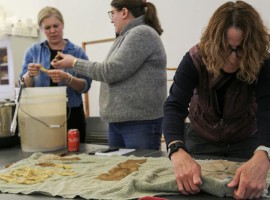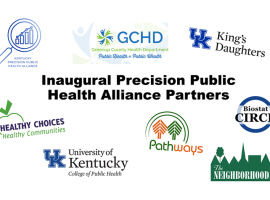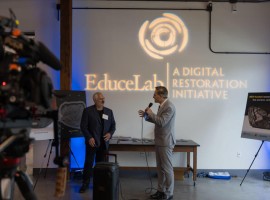Center for Health Equity Transformation Seeks to Improve Health of All Kentuckians
People in Kentucky experience some of the highest rates of cancer, cardiovascular disease, substance use, diabetes and obesity in the nation. These health disparities are the focus of work inside the Healthy Kentucky Research Building (HKRB), UK’s newest research facility.
The burden of these health inequities falls heavily on rural, minority and socioeconomically disadvantaged populations. Through research and training, the Center for Health Equity Transformation, many of whose faculty are housed within HKRB, seeks to improve the health of the most vulnerable residents of Kentucky and beyond.
Nancy Schoenberg, Center for Health Equity Transformation (CHET) director, said the center’s mission is to address health disparities in Kentucky with a focus on making sure all populations are able to enjoy the benefits of evidence-based prevention, early detection and optimal treatment.
Sonja Feist-Price, vice president for institutional diversity, explained, “Equity is critically important because it recognizes that we are attuning to the needs of diverse populations, based upon the social, cultural, psychological kinds of issues that limit their ability to maximize their quality of life and their health care.”
“We could come up with the greatest new therapy we could imagine, but yet if it’s not accessible or useable or understandable to a particular community it’s not going to be very effective,” said Robert DiPaola, dean of the UK College of Medicine. “It’s our responsibility to team up to address these health inequities.”
With seven primary faculty, 15 core faculty and more than 140 faculty affiliates across UK, CHET researchers are partnering on a wide range of health equity-focused projects. One of these researchers, Shyanika Rose, an assistant professor who came to UK in July 2019 from a national nonprofit tobacco advocacy group, studies tobacco marketing.
Rose noted that menthol cigarettes have been disproportionately marketed to African Americans, to the point that almost 90% of African-American smokers smoke a menthol cigarette. Menthol has been associated with more difficulty quitting and more progression to regular use. She said, “When you think about marketing a flavored product that may be more appealing to a community that may be already more disadvantaged, you really start to see how unfair that is and how we really should be putting a bright spotlight on that and figuring out ways to use policy or interventions to reduce that impact.”
The center is also creating a pipeline to train the next generation of health equity researchers. The Students Participating as Ambassadors for Research in Kentucky (SPARK) program for undergraduates provides mentorship and trains students to design and conduct applied research projects. The first three students in this program are Hannah Bowling, a junior from Hazard, Kentucky, and sisters Sidney Bibbs and Simone Bibbs, sophomores from Lexington, Kentucky.
Bowling’s research project on physical inactivity explored how to get people more involved in newly developed hiking trails and river kayaking in her community in Perry County.
Sidney Bibbs’s research project on sickle cell anemia focused on barriers and motivators behind blood donation among African Americans in Lexington.
Simone Bibbs’s research project is on the rehabilitation and community reintegration of sex trafficking survivors within recovery support programs in Kentucky. Expressing enthusiasm for the SPARK program, she said, “To be able to come up with your own survey questions and your own research topic and go out into your community, ask questions and get answers, I think it’s just a great opportunity for any student. Especially as a minority student, I think it's great that there’s a center dedicated to research for minority populations, whether it’s race or socioeconomic status. It's great that there’s a center dedicated to finding answers.”
Myles Moody, a research assistant in CHET and a doctoral candidate in sociology, is the research program coordinator for SPARK. He said, “The SPARK program has been one of the most rewarding things I've done in higher education. I was able to take them from the very beginning of how to develop a research question all the way through the process of getting IRB approval, and then going out into their communities collecting data. And I think it's been most rewarding because as a researcher, as someone who loves research, I'm able to help someone else develop those skills.”
Moody, who studies how vicarious racism impacts the psychological well-being of black Americans, is also a DREAM scholar. The Disparities Researchers Equalizing Access for Minorities (DREAM) program, co-sponsored by CHET, the Center for Clinical and Translational Science (CCTS) and the College of Nursing, provides networking and mentorship for pre-doctoral, doctoral and postdoctoral scholars.
Schoenberg said these cross-disciplinary and cross-college training programs, in addition to workshop series, pilot grant program, training and biostatistics design cores, and grant consultations are how CHET is engaging the campus community to move the needle on health disparities in Kentucky. To learn more, visit the CHET website: chet.med.uky.edu.





